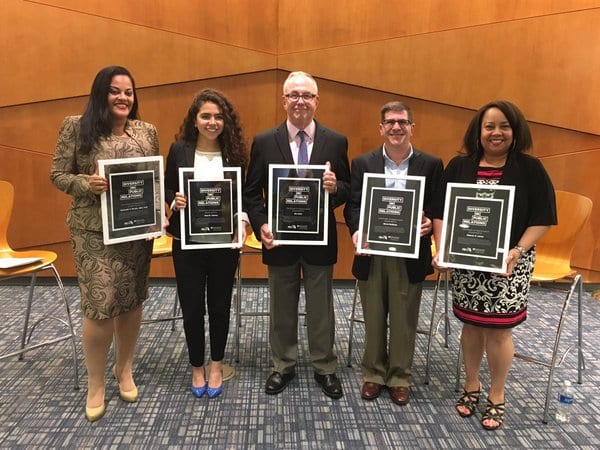
Sharon Jones (far right), taking part in PRSSA Diversity in Public Relations panel discussion.
The other day I was out grocery shopping and a small but significant encounter gave me pause to reflect. As I approached the doors to my local supermarket, I noticed three young black men talking to each other while standing on either side of the entrance. I also noticed walking just ahead of me a Caucasian woman with her young daughter. Rather than walk between the young men to go through the entrance, they entered through the exit door.
I, on the other hand, walked between the young men without a second thought. As a woman of color – my father is a black man, I married a black man and I raised a black son – I had no hesitation walking between the men outside the store. It made me wonder, could unconscious bias be at play here?
Understand that unconscious bias is something we all carry with us – for better or worse. It unites and separates us. Many individuals have a natural affinity to people or things that are “like me.” And while this can offer a strong comfort zone, we have to take conscious steps to modify it. When left unchecked, our unconscious biases can shape our daily behavior and feed into a collective fear that has societal consequences that can, at best, alienate others and, as recent events have shown, have devastating impact.
I think what troubles us most about the news coming from Orlando, Baton Rouge, St. Paul and Dallas is that these are not isolated events. Rather, they are symptomatic of racial disparity and the lack of an inclusive culture. People are troubled on a very personal level because there are countless statistics of the social disparities that justify the raw emotion seen in the protests taking place around the country. When we truly tap into our empathy and imagine that the person shot could be our brother or father or son, we all get it.
I believe we can do better and it takes individual actions for that to happen. I agree with the comments shared by one of the leaders in our Dallas office: “I, like many of you, have trouble making sense of any of it and unfortunately these tragic events promulgate a minority of hate that has a louder voice at times then one of peace.”
If you’re wondering what we can do better on a daily basis, here are a few suggestions:
- Acknowledge that these societal events impact each of us.
- Increase personal awareness of bias about certain groups and work to change it.
- Expand your personal and professional circles to elevate your levels of self-awareness and empathy for the cultural sensitives of others.
- Engage your expanded social networks in meaningful conversations and listen closely for similarities. We fear the unknown, but when the unknown becomes familiar, the fear dissipates.
I consider myself fortunate to have had the opportunity, both personally and professionally, to be exposed to people of so many ethnicities, cultures, sexual orientations, religions and socio-economic backgrounds. These experiences have helped me to modify my unconscious biases and work to find ways to support an inclusive workplace and community. I hope this article inspires each of you to do the same.